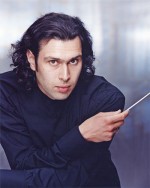Title
Early Shostakovich works are on the bill when Russian conductor Vladimir Jurowski makes his Juilliard Orchestra debut on November 25. In addition to the composer’s First Symphony, Jurowski will also conduct two rarely heard pieces: The New Babylon, Shostakovich’s first film score, and Hypothetically Murdered, a collection of music hall tunes.
Body
While Jurowski, 41, is the son of conductor Mikhail Jurowski, when he was growing up, he wasn’t sure if he wanted to become a conductor—he was also drawn to theater and film. But in 1988, he attended a performance of the Schleswig-Holstein Youth Orchestra led by Leonard Bernstein of, as it happens, Shostakovich’s First Symphony. It was a revelation for the young artist, who, in a recent interview, told The Journal he “can still remember every bar of that concert.” That experience and one the same year of Mahler’s Symphony No. 8—the first Mahler performance allowed in the Soviet Union for years—were both epiphanies for Jurowski. He began to see the conductor’s role in the performance milieu as comparable to that of a midwife during a birth: “The child is not ours, but we facilitate its birth,” he said, speaking shortly after arriving in New York to conduct Richard Strauss’s Die Frau ohne Schatten at the Metropolitan Opera this month.
“The orchestra is like an instrument to the conductor, but the conductor is not a soloist, he is a co-creator, uniting the efforts of the others along the lines of the composer’s wishes,” he said, adding that a conductor should be a coach, director, and inspirer to the orchestra while maintaining a respectful and awestruck relationship to the composer and his music.
Jurowski began his studies at the Music College of the Moscow Conservatory and in 1990 he and his family moved to Germany, where he studied at the Musikhochschule of Dresden and Berlin under Rolf Reuter (conducting) and Semion Skigin (vocal coaching). He made his debut at Ireland’s Wexford Festival in 1995, and was soon in demand at leading European houses. The principal guest conductor of Italy’s Teatro Comunale di Bologna and of the Russian National Orchestra, Jurowski has also been the music director of the Glyndebourne Festival Opera since 2001 and the principal conductor of the London Philharmonic Orchestra since 2007.
Jurowski is particularly looking forward to the Juilliard program since he has really “championed these pieces,” he said. Shostakovich wrote The New Babylon in 1929 to accompany a silent film written and directed by Grigori Kozintsev and Leonid Trauberg. It depicted a carefree Paris compromised by the 1871 Paris Commune through the story of two lovers separated by the Commune’s barricades. The New Babylon is the first of Shostakovich’s 35 film scores, and Jurowski called it “a flash of young genius” that prefigured some of the most remarkable ideas of Shostakovich’s compositional career,” ideas that the composer spent decades revising and perfecting. Though the work, which was written for a large chamber ensemble, is seminal and virtuosic, it’s rarely performed. Jurowski attributes this to the fact that Shostakovich never arranged a suite or any other means of performing the music independently from the film, which was initially criticized. Still Jurowski said, “it was an important source of inspiration for [contemporary] composers and it changed the way they looked at ‘absolute music’.” He believes the work’s youthfulness will complement the Juilliard orchestra and that the musicians will relish the challenge of the work, which he considers “an absolute must for anyone wanting to get to know Shostakovich’s music.”
Shostakovich composed 15 symphonies, 15 string quartets, 5 operas, 35 film scores, and countless other works. There were few things he did only once. One is music-hall entertainment, a genre he ventured into at age 25 with Hypothetically Murdered, a score that was lost in World War II and reconstructed a decade or so ago by composer-conductor Gerard McBurney from outlines and sketches from a type of Russian vaudeville called Light-Music Circus. The reconstructed piece features Shostakovich’s raunchy accompaniment to a combination of slapstick and dark, Russian political satire. Jurowski called the work “a welcome addition to orchestra repertoire—full of youthful energy and invention” and feels that it’s performed infrequently because the show itself no longer exists. If it did, he said it would be something like a collaboration of Cirque du Soleil, a Broadway musical, and maybe a jazz concert—and he dreams of someday performing the piece in its entirety with some kind of staging. The piece, he said, is “hilariously funny in places and carries explicit connotations of entertainment music.”
The evening will close with Shostakovich’s First Symphony, which also displays this iconic composer’s young genius. Jurowski said that while the work is not mature, it encompasses many of Shostakovich’s future musical ideas and “displays a remarkable prophetic knowledge of both the future of his music as well as the future of his country.” The work is fascinating, utilizing a poised and academically oriented compositional style that Shostakovich learned at the Petrograd Conservatory from Alexander Glazunov, but it also retains an avant-garde and youthful character. All of the music and its conductor should provide an electrifying experience for both orchestra and audience.





